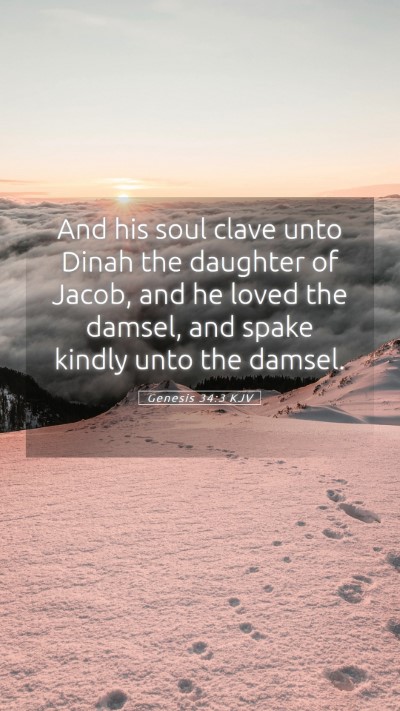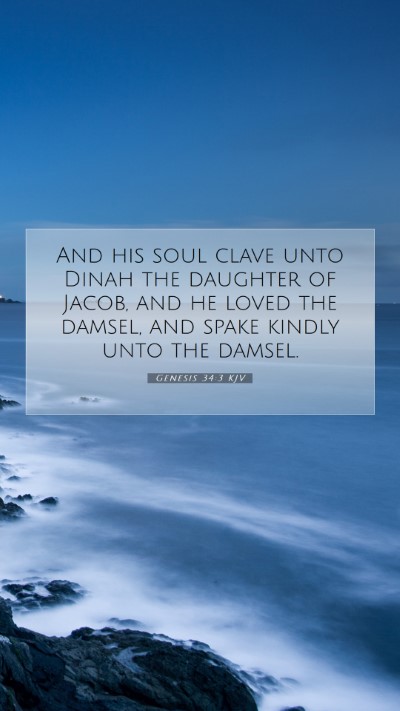Genesis 34:3 - Explanation and Commentary
The verse states: "And his soul clave unto Dinah the daughter of Jacob, and he loved the damsel, and spake kindly unto the damsel." This passage is set in the context of Shechem's interaction with Dinah, the daughter of Jacob, highlighting the complexities of their encounter.
Understanding the Context
In examining Genesis 34:3, we see a significant moment in the narrative of the patriarchs. Dinah, the daughter of Jacob and Leah, goes out to see the daughters of the land, which leads to her encounter with Shechem, the son of Hamor the Hivite. This event occurs in a turbulent atmosphere characterized by cultural clashes, family honor, and the implications of intermarriage.
- Matthew Henry's Commentary: Henry emphasizes the emotional connection Shechem develops with Dinah. He notes how his love is powerful enough to transcend mere physical attraction—suggesting it might also be a misguided passion, reflecting Shechem's desires against the backdrop of unyielding family honor.
- Albert Barnes' Notes: Barnes provides insight into the implications of Shechem's actions. He analyzes the idea of love as depicted in the passage, interpreting it as both genuine affection and a possible reflection of a more selfish motivation. Barnes also highlights the moral ramifications of Dinah's situation and the resulting turmoil within Jacob's family.
- Adam Clarke's Commentary: Clarke expands on the differences in cultural practices between the Hebrews and the Canaanites. He indicates that the love Shechem professes for Dinah can be seen through the lens of genuine admiration, which is contrasted with the violence that follows. Clarke stresses the importance of Dinah's perspective in the interpretation of this love and the resulting decisions made by her family.
Key Themes and Insights
This passage invites readers to explore various themes such as:
- Cultural Conflict: The interaction between Shechem and Dinah illustrates the cultural tensions between the Israelites and the Canaanites, raising questions about identity and belonging within the patriarchal narratives.
- Love and Manipulation: The depiction of Shechem’s affection for Dinah poses an essential question regarding the nature of love, especially in a context where power dynamics can overshadow genuine feelings.
- Family Honor and Consequences: Shechem’s actions lead to significant consequences for both Dinah and her family, which speaks to the broader biblical theme of consequences resulting from familial honor and decision-making.
Applying the Verse to Modern Life
Genesis 34:3 serves as a reflective point for modern readers, especially in understanding the complex nature of relationships and the intersection of personal desires and societal norms. Some applications might include:
- Understanding the importance of respecting personal boundaries and cultural differences.
- Recognizing how emotional connections can sometimes lead to conflict, and navigating these situations with wisdom.
- Valuing the principles of family and community, as well as the consequences that certain actions may entail.
Cross References
This verse is related to several other passages that shed additional light on its themes and implications:
- Genesis 34:1: The initial action of Dinah going out to visit the daughters of the land.
- Deuteronomy 7:3-4: The laws regarding intermarriage with the Canaanites and their implications for Israel.
- Genesis 49:5-7: Jacob's pronouncement on the actions of Simeon and Levi in response to Shechem's actions.
Conclusion
Genesis 34:3 reveals the complexities of love, cultural interaction, and family honor. The interpretations provided by esteemed commentators help to unpack these layers, illustrating how this ancient text continues to resonate in contemporary discussions about ethics, relationships, and the challenges of cultural integration.


